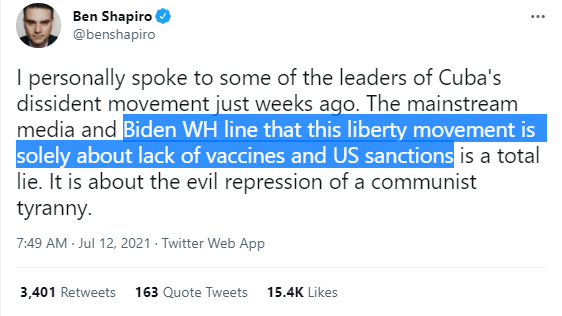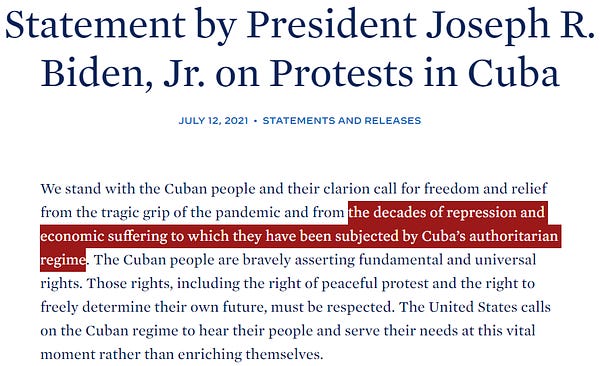What The Hell Happened To The Claremont Institute?
Nativist, racist, illiberal, and post-truth
Laura K. Field is a senior fellow at the Niskanen Center and a scholar in residence at American University. In today’s Bulwark, she offers a deep-dive into the the decline of a once-distinguished conservative think tank that has plunged into Trumpism, illiberalism, and lying about the election.
It is an immensely important piece.
While it’s both and easy and tempting to focus on the low-hanging fruit of the Trumpist right — the morons, charlatans, and cut-rate grifters like Charlie Kirk, Sean Hannity, Dan Bongino, Candace Owens, Seb Gorka, and drunken Rudy — the descent into illiberalism also has a more serious component.
Beyond the clown show, the story of how the right lost its mind also includes what Julian Benda once called la trahison des clercs — The Treason of the Intellectuals — an ugly turn by foundations and think tanks who provide a veneer of intellectualism to the darker impulses of the post-truth Right.
In her piece, “What the Hell Happened to the Claremont Institute?” Field traces the atrophy of one of those institutions. “The Claremont Institute used to be one of the principal places for conservative intellectuals to come together,” she writes. It was founded by scholars who were taken seriously even by people who disagreed with them, and some such scholars still publish in the pages of the [Claremont Review of Books].
“That Claremont has been unparalleled in its intellectual submission to Trumpism should give us pause.”
After all, in some respects the Claremont crowd is precisely the sort who should have known better: deeply read in political philosophy and history, and familiar with the many warning signs that Trump would be a damaging and divisive president. There is also a sense, however, in which the Claremont crowd’s submission to Trump was the most predictable thing in the world—the simple culmination of a political theory rooted in jingoism and denial.
Really, read this whole thing.
Like think tanks from time immemorial, Claremont hoped that it could influence the president and his administration. But the lines of influence mostly pointed in the other direction: Claremont’s encounter with Trumpism left Donald Trump unchanged—he did not become enamored of America’s highest ideals—while the Claremont Institute was remade in his image. Not just nativist and racist. Not just illiberal and prone to conspiracy theories. But even post-truth. And now, explicitly anti-democracy.
And I worry that they are just getting started. Claremont is swiftly becoming a propaganda juggernaut. It is welcoming divisive, anti-democratic figures. Through its publications and other programs, it is in a position to warp the intellectual formation of young writers, lawyers, and academics who will presumably play an important part in the future of the American right. And the institute, having been thus transformed by its years-long embrace of Trump, now yearns for a radical remaking of America.
I wonder: Do the respected scholars and thinkers who continue to write for the Claremont Review of Books agree with the new direction of the institute? Do they think that contributing only to the higher-end publication insulates them from being associated with the grossest parts of the overall Claremont project? Their continued involvement suggests that Claremont can continue to operate with reputational impunity. One wonders when, if ever, they might be willing to draw a line.
Similarly, do all of Claremont’s scholars and fellows, their hundreds of fellowship alumni, including former faculty fellows, feel comfortable having their names used in fundraising efforts on behalf of the institute’s latest undertakings? Or will they voice an objection?
And are the foundations whose grants fund Claremont, including a number of small family foundations, aware of what the institute has become?
[A printable PDF of this article is available here.]
Confronting “Information Disorder”.
The Aspen Institute’s Commission on Information Disorder is out with an interim report that acknolwedged the scope of the challenge ahead: “It will take he whole of society, and time, to climb our way out.”
One of the commission’s co-chairs is Chris Krebs, who served as Director of the Cybersecurity and Infrastructure Security Agency in the United States Department of Homeland Security from November 2018 to November 2020 — when he was fired by tweet for refusing the back Trump’s Big Lie.
Stay tuned: Krebs will join me later today on the Bulwark podcast.
Do yourself a favor. Watch this:


They are now just saying it out loud.


Meanwhile: Tennessee's former top vaccine official: 'I am afraid for my state'
On Monday, July 12, the Tennessee Department of Health fired Dr. Michelle Fiscus, the top vaccine official in the Tennessee state government. Fiscus said she was scapegoated to appease Republican state lawmakers who are angry about efforts to vaccinate teenagers. After losing her job, Fiscus released a 1,200-word statement about the ordeal….
Giuliani’s Master Plan.
Obviously a must-read: Part one of an excerpt from “I Alone Can Fix It: Donald J. Trump’s Catastrophic Final Year” by Carol D. Leonnig and Philip Rucker:
After a while, Rudy Giuliani started to cause a commotion. He was telling other guests that he had come up with a strategy for Trump and was trying to get into the president’s private quarters to tell him about it. Some people thought Giuliani may have been drinking too much and suggested to Stepien that he go talk to the former New York mayor. Stepien, Meadows and Jason Miller took Giuliani down to a room just off the Map Room to hear him out.
Giuliani went state by state asking Stepien, Meadows and Miller what they were seeing and what their plan was.
“What’s happening in Michigan?” he asked.
They said it was too early to tell, votes were still being counted and they couldn’t say.
“Just say we won,” Giuliani told them.
Same thing in Pennsylvania. “Just say we won Pennsylvania,” Giuliani said.
Giuliani’s grand plan was to just say Trump won, state after state, based on nothing. Stepien, Miller and Meadows thought his argument was both incoherent and irresponsible.
“We can’t do that,” Meadows said, raising his voice. “We can’t.”
Exit take: They did. And that’s basically the whole strategy now.
Speaking of new books. We’re not doing this Michael Wolff thing again are we? Here’s a flashback to what I wrote back in May 2019:
Did we learn anything from the last time around?
Writing for the late Weekly Standard, Matt Labash, described Woolf’s original tome as “The Book That Ate Washington.”
Everyone who was anyone read it, or pretended to; the book was a massive, record-shattering best-seller. Woolf was everywhere, enjoying nearly Avenatti-level celebrity (even before Avenatti was a thing.)
And then people realized that it was a hot mess; sloppy, error-ridden, and dishonest.
Again, there had been warnings, but they were ignored, because what Woolf was offering was just so juicy.
In 2008, the late David Carr raised doubts about Woolf’s reliability. “Historically, one of the problems with Wolff’s omniscience is that while he may know all,” wrote Carr, “he gets some of it wrong.”
Four years earlier, in 2004, Michelle Cottle had written:
Much to the annoyance of Wolff’s critics, the scenes in his columns aren’t recreated so much as created–springing from Wolff’s imagination rather than from actual knowledge of events. Even Wolff acknowledges that conventional reporting isn’t his bag. Rather, he absorbs the atmosphere and gossip swirling around him at cocktail parties, on the street, and especially during those long lunches at Michael’s.
But at least for a while, readers were willing to overlook Woolf’s shaky track record, even if much of the book was less factual than true…ish.
You might recall that things ended badly for Woolf, as doubts about the book multiplied. Most spectacularly, he was kicked off the set of Morning Joe for continuing to insinuate – without evidence – that Trump was having an affair with U.N. Ambassador Nikki Haley. As the Hollywood Reporter recounts:
Mika [Brezinski]: This week, Wolff said that Haley has “embraced” the notion of the affair by denying it specifically.
“What I meant was: I found it puzzling she denied something she was not accused of,” Wolff said on the show.
“Wait a minute,” Brzezinski replied. “Can I just step in here?” She asked Wolff if he regrets inferring the Haley-Trump affair in the book.
“You might be having a fun time playing a little game, dancing around this, but you’re slurring a woman,” she said. “It’s disgraceful.”
After Wolff again insisted that he did not directly suggest the Haley affair, Brzezinski replied, “Come on. Are you kidding? You’re on the set of Morning Joe. We don’t B.S.”
Brzezinski then abruptly ended the interview and threw to commercial. “I’m sorry, this is awkward, you’re here on the set with us, but we’re done,” she said. “Michael Wolff, thank you. We’re going to go to break now. Bye, everyone.”
There’s no do-over for Avenatti, only regrets and selective amnesia. Not so with Woolf.
The GOP Cancel Culture is too much even for the WSJ. The editorial board writes:
Some conservatives want to deploy progressive silencing tactics for their own ends. Good luck achieving that in the liberal university. Inviting bureaucrats to exercise more control over political speech on campus will further cement liberal dominance. …
The irony of this attack on [Larry] Sabato is that academia’s progressive excesses are a political gift to Republicans. Yet the Virginia GOP has managed to make itself the cancel-culture aggressor ahead of an election, and on behalf of an ex-President who lost the state twice.
I had some thoughts.


Quick Hits
1. Right-Wing Violence Threatens Georgian Democracy
In today’s Bulwark, Besiki Kutateladze and David J. Kramer write that anti-LGBTQ riots have claimed at least one life in the struggling Caucasian country.
The scenes from Tbilisi this month mark the latest and ugliest political crisis for Georgia. The precipitating event was the planned Tbilisi Pride March, scheduled for July 5. Right-wing and pro-Russian factions in the country called for a counter-demonstration which devolved into multiple days of violence against LGBTQ activists and reporters (for good measure). Georgia, once a promising, bourgeoning Eurasian democracy and a key partner of the United States and NATO, is descending further into chaos and illiberalism.
2. The Problem With Prosecutor Punditry
Ankush Khardori writes that experts keep promising the walls are closing in on Trump. It’s not always true, is it?
The actual charges filed by the Manhattan district attorney’s office are undoubtedly serious, but it is far from clear what will happen next, which has prompted a range of reactions among the legal commentariat that seem to differ more on points of emphasis, tone, and probability, than on the ultimate danger to Trump. Some have been circumspect, others more adventurous. Immediately after the filing, one prominent legal pundit confidently told The New Yorker, “They are on the precipice. They are on the brink of a much larger case against Trump and his businesses.” Another contemplated a domino effect extending beyond just the Manhattan DA, with a potential future charge against Trump opening “the floodgates for other prosecutors’ offices to wade into the Trump-indictment pool.” A former litigator for the New York attorney general’s office argued for the Washington Post that the widespread interest in Weisselberg’s potential as a cooperator against Trump was misplaced — that a case could largely be built simply on documents — and offered that he had “helped lead” the office’s civil lawsuit against Trump University (something he called a “civil prosecution,” which is not a thing).
Cheap Shots
Your daily Ben.



The Revolution eats its own.


Meanwhile, you hate to see it: “Trump 2020 legal adviser Jenna Ellis leaving Republican Party in protest.”
Ellis made the announcement on Real America's Voice and called on RNC Chairwoman Ronna McDaniel and other members to "resign now" to create a clean slate, adding she would not return until they do.
She also questioned what happened to the "millions raised" by the RNC in November and December of last year when the election challenges were playing out, saying, "the Trump team never saw a dime of that help."
"I am leaving the Republican Party until the Republican Party comes back home to conservatives," she said during an follow-up appearance on Newsmax, on which she is a contributor.
A November email reported by the Washington Post showed Justin Riemer, chief counsel for the RNC, discouraging a staffer from posting about ballot fraud claims made by Trump's team. He called the legal endeavor led by Rudy Giuliani and Ellis "a joke" that was misleading millions of people.





